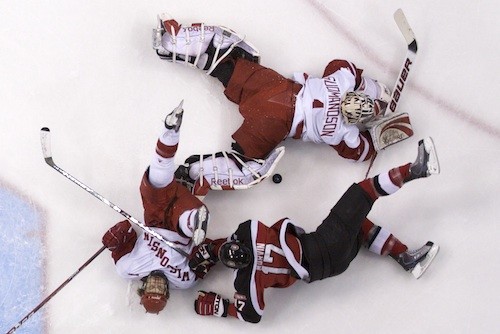The look was different, the results were decisive and things followed a trend.
Having seen St. Cloud State’s dangerous power play plenty of times in five previous games this season, Wisconsin made a subtle adjustment on its penalty kill for the big-stakes season series finale.
The result may have been the element that nudged the Badgers past the Huskies and into the Frozen Four.
Wisconsin held St. Cloud State scoreless in seven power-play tries Saturday during the West Regional final at the Xcel Energy Center, and the Badgers emerged with a 5-3 victory.
In six games between the teams this season, the Badgers won the three times in which they held the Huskies without a power-play goal and lost the three times they conceded while shorthanded.
“I thought the penalty kill did an unbelievable job,” said Wisconsin goaltender Scott Gudmandson, who turned away all 10 shots he faced on St. Cloud State man advantages. “The guys were blocking a ton of shots, clearing out most of the rebounds that I had. We did a great job with the PK, and that was probably the difference in the game.”
The small change that Huskies coach Bob Motzko noticed against his power-play units, which converted on nearly one in five chances this season, was pressure along the boards from Badgers players.

In turn, that helped take away the passing lanes to Garrett Roe and Ryan Lasch that are such an important part of the road map for the St. Cloud State power play.
“We just couldn’t breathe on our power play,” Motzko said.
St. Cloud State was 3-for-7 with the man advantage a night earlier against Northern Michigan, including the second-overtime winner from Tony Mosey.
When the Huskies scored a power-play goal this season, they were 20-3-4; they were 4-11-1 when being held scoreless.
“Our power play is most successful when we’re on our toes, being quick, making plays, and we weren’t doing that tonight,” St. Cloud State captain Garrett Raboin said. “I don’t think we were making quick decisions with the puck. They were certainly forcing us to make quick plays, and we just weren’t able to do it.”
Wisconsin’s penalty kill ranks 10th in the nation, but there have been some significant setbacks this season. Most notable was a 5-for-8 outing by Minnesota in a regular season-closing 6-1 loss on March 7.
The Badgers had conceded at least one power-play goal in three straight games, but they were usually able to make up for it with a potent power play.
On Saturday, however, the Huskies also negated the Badgers’ man-up efforts and scored a shorthanded goal in the third period.
Getting so much special teams experience against each other probably set the stage for that washout.
“I think it’s the familiarity that we have with both units and not allowing them to do exactly what they want, doing the right things, working as a cohesive group of four plus the goaltender to not give them the Grade-A, A-plus chances,” Badgers coach Mike Eaves said. “They did the same to us.”
The Huskies may have felt some fatigue on power play efforts, Motzko said.
“We felt helpless,” he said. “We were just trying to throw them into the fire and point them in the right direction. There were plays to be made; we just couldn’t fight through.”
St. Cloud State may have won the special teams battle with the shorthanded goal, but the Badgers emerged unscathed elsewhere.
“We know the players that they’re putting out there, and we just really wanted to focus on not giving them a lot of high-quality scoring chances and keeping shots from out on the perimeter and blocking shots as much as we could and making sure we were getting pucks 200 feet,” Badgers defenseman Ryan McDonagh said. “From everybody that was out there on the PK units, they did a tremendous job.”


